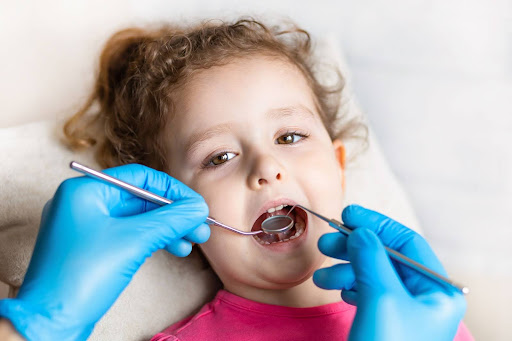Does My Two-Year-Old Need to See the Dentist?

It’s a common misconception that young children with milk teeth don’t need to visit the dentist. After all, their primary teeth will fall out anyway, so it’s better to take them to the dentist when their permanent teeth erupt. This approach can damage your little one’s oral health and development. The Australian Dental Association recommends taking your child to the dentist when their first teeth come in or by their first birthday. However, the average Australian child’s first visit to the dentist is usually at 4 years. By this time, most children have 20 primary teeth, of which some may already have developed tooth decay. How does this affect their oral health, and what can you do to ensure your child’s oral health and early development are on the right track? Read more in our blog.
Importance of Oral Care During Early Dental Development
Baby teeth develop before birth and continue to erupt from around six months until the child is about two to three years old. Baby teeth erupt through the gums, usually starting with the lower central incisors (bottom front teeth) followed by the upper central incisors, lateral incisors, first molars, canines, and second molars. As the child grows, the roots of the baby’s teeth resorb, allowing the permanent teeth to push them out. Baby teeth are gradually replaced by permanent teeth starting around age six and continuing into the teenage years.
Some children have their first tooth by 6 months, while others may have it after one. The earlier the tooth erupts, the higher the chances of getting oral problems. Tooth decay in children can start when their first tooth appears. The usual causes of tooth decay in very young children can be caused by leaving the feeding bottle in the mouth when they’re sleeping, applying sweet things such as honey or syrups on their pacifier or prolonged night-time milk feeds. If parents or caregivers have untreated dental decay in their mouths, they can also pass on on decay causing bacteria when they share close contact with their children (eg. when they kiss them, share utensils etc). This increases the chances of premature tooth decay if the gums and teeth are not kept clean and bacteria-free. It’s important to note that parents with very healthy teeth will also pass on their healthy bacteria, making their kids more resistant to dental problems when they are older.
The last baby teeth to be replaced by adult teeth usually happens around age 10-12 years of age. These are the baby canines and molars. If preventive measures are not taken with regular dental checkups, consistent oral hygiene and cavity treatment, the risk of damaging the surrounding healthy teeth increases. Premature tooth decay can also cause pain, discomfort and eating difficulties, affecting the child’s growth. Also, extracting a tooth too early because of decay can lead to alignment issues as the permanent teeth are still developing. Baby teeth play a major role in jaw development, helping the adult teeth grow into the correct positions, thus making it essential to take care of them once they erupt.
RELATED: WHAT TO DO WHEN PLAQUE BUILDS UP ON BABY’S TEETH
Benefits of Dental Checkups for Young Children
Did you know that about 20% of children between 2 and 5 may have untreated cavities? Early dental checkups play a critical role in dental development in children and provide the following benefits:
Early Detection for Timely Intervention
Routine dental checkups form the foundation of preventive care, helping maintain healthy teeth and gums and protecting your child from emerging oral issues. Schedule your child’s first dental appointment around their first birthday, and then continue with regular check-ups every six months or as your dentist advises. This helps the dentist catch tooth decay early, recommending preventive measures and strategies to help you protect your little one’s teeth and monitor the development of teeth, jaws, and oral structures. This also helps identify potential issues, such as malocclusion or orthodontic problems and allows for timely intervention to address them.
Oral Hygiene Guidance
Regular dental visits help educate parents and caregivers about proper oral hygiene practices like keeping your baby’s teeth and gums clean, eating and snacking healthy, and habits that can harm your child’s oral health. Establishing good oral hygiene habits at a young age sets the foundation for a lifetime of healthy teeth and gums.
Promoting Positive Dental Experiences
Taking children to the dentist from a young age helps create positive dental experiences from the beginning. It becomes part of their oral care, taking anxiety and fear out of going to the dentist. This helps establish trust and form lasting relationships with their dentist, setting the stage for a lifetime of preventive and proactive care for a healthy and radiant smile.
What to Expect During the First Dental Visit
The first dental visit for a young child does not involve any treatment. It only includes a mouth examination to assess the condition of their teeth and growth and look for any signs that might indicate decay or growth issues.
At Whitehorse Dental, we don’t push the children to do anything they are not ready for. Our priority is to ensure their comfort, helping them feel relaxed and happy. We answer their questions, try to establish trust and never force them to do anything. If the child feels comfortable in the dental chair, we will examine them in the chair. If they want to sit in their parent’s lap, we do the checkup there. After checking the teeth, we reinforce their at-home oral care habits. If there are any signs on the child’s teeth that indicate early signs of damage, we talk to the parents and child to identify what might be causing the problem. Our aim is to find these clues to prevent any future damage to the teeth. We may polish the teeth with a special polishing paste and apply fluoride to strengthen and protect the teeth if required. If there are signs of early tooth decay, we recommend cavity treatment with no drill dentistry. It involves applying a special medication to the decayed tooth to kill the bacteria and halt the decay. It’s quick and gentle and does not involve drilling, making it suitable for kids of any age.
Tips for Toddler Oral Care at Home
Patient education and oral hygiene instruction form the core of our approach at our Blackburn Clinic. Instilling proper oral hygiene habits from a young age keeps most dental problems away, saving children from pain and the discomfort of sitting through dental procedures.
Here are a few tips for at-home oral care for toddlers:
- Since younger children cannot brush their teeth properly, teaching and supervising them during brushing until the age of 8 is best.
- For children with two front upper and lower teeth, you can use a damp cloth or a finger with a tiny bit of toothpaste if your child doesn’t like the feel of a toothbrush. However, a toothbrush is the most effective tool for cleaning the teeth.
- Use a soft-bristled toothbrush and a small amount of fluoride toothpaste (about the size of a grain of rice) to brush the teeth gently in circular motions.
- Brush twice daily, preferably in the morning after breakfast and before bedtime.
- Show your toddler how to brush their teeth properly with gentle circular motions along the gumline and all tooth surfaces. Encourage them to spit out toothpaste rather than swallowing it.
- Limit sugary snacks and beverages in your toddler’s diet, as they can contribute to tooth decay.
- Avoid frequent snacking, as having more than five meals a day does not give the mouth enough time to neutralise the acid, thus putting children or adults who don’t have enough breaks during meal times at higher risk of tooth decay.
- If your toddler uses a pacifier, limit it, especially as they approach age 3. Prolonged pacifier use can affect dental development and increase the risk of orthodontic problems.
- Be a positive role model for your toddler by demonstrating good oral hygiene habits. Let them see you brushing your teeth and make oral care a family affair.
- If you notice any dental problems or signs of cavities, such as tooth sensitivity, discolouration, or pain, consult a dentist promptly for treatment.
Healthy Oral Habits Begin Early!
Your child’s oral health journey begins with early dental care. So keep your child’s smile strong and healthy, prioritising routine dental checkups from a young age. At Whitehorse Dental, we offer preventive care for the entire family, minimising the risks of dental problems and helping you and your child maintain optimal oral health. If your child hasn’t had their first dental checkup yet, book an appointment with us today.

